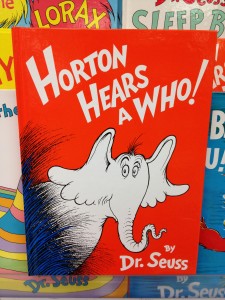
These days, the avalanche of self-help business books can be a little overwhelming. You could attempt to absorb massive amounts of esoteric information by listening to such books on tape. Or perhaps you’ll consider reading the SparkNotes versions of corporate tomes.
Another alternative is to pursue a less stressful, more enjoyable path to philosophical business enlightenment by reading children’s books. The benefits to you are all positive.
The books I’m about to recommend are relatively brief, don’t spew business jargon at your overloaded brain, and can be repurposed as gifts for a friend or family member’s precocious little tyke. Consider integrating the messages in these books with how you treat the other professionals buzzing within your particular business hive.
Ready to freshen up your business book collection in a most delightful way? Clip-on reading light and school-library bookmark not included…
When Horton Hears a Who, He Stands Up for “Invisible” Workers Everywhere: Of all the books penned by Dr. Seuss offering some type of lesson or moral, 1954’s Horton Hears a Who is my favorite.
The other animals in Horton the Elephant’s kingdom don’t believe life exists on the speck of dust he’s placed so thoughtfully onto a clover. But Horton is determined to help the residents of Whoville, because “a person’s a person, no matter how small.”
Horton withstands pressure from a “sour” kangaroo, a group of duplicitous monkeys and a menacing vulture, refusing to allow the unseen Whos of Whoville to perish. Even when threatened that his clover will be boiled in “Beezle-Nut” oil, Horton won’t give in or give up.
Once the microscopic Whos manage to make some noise, the drama comes to an end. At last, the other animals hear a “Yopp!” breaking through the stratosphere.
The book’s recurring theme of “a person’s a person, no matter how small” should make you realize something important. Regardless of status or position in your company’s pecking order, each employee deserves the opportunity to make his or her “Yopp!” heard. Never “boil” your most shy or quiet of team members with harsh words (or isolation)–emulate Horton and hear every Who in your Whoville!
Shift Your Paradigm and Management Style–Be a Little Prince: When Antoine de Saint-Exupery wrote The Little Prince in 1943, he penned a timeless handbook not just for children but for adults regarding the fine art of being able to recognize what’s important in life. This book is so deep that it’s metaphysical.
The narrator, a pilot stranded in the Sahara Desert (and trying to fix his downed plane), encounters “an extraordinary little fellow.” Their relationship begins with the little prince asking the pilot to draw him a sheep. (Baa…)
The rest is quasi-existential history. A steady stream of profound statements and also gentle mockery regarding adult personas (a vain man, a drunkard, a lamplighter, and more) ricochets throughout the narrative. This particular book isn’t easily summarized, so I urge you to read it. You’ll encounter many nuggets of wisdom throughout the story, including:
“Here is my secret. It is very simple: It is only with the heart that one can see rightly; what is essential is invisible to the eye.”
“…It is much harder to judge yourself than to judge others. If you succeed in judging yourself, it’s because you are truly a wise man.”
“…People haven’t time to learn anything. They buy things ready-made in stores. But since there are no stores where you can buy friends, people no longer have friends.”
If you don’t yet own a copy of The Little Prince, I feel sad for you…
To Boost Business Creativity, Get Yourself a Purple Crayon: You may not know the name Crockett Johnson, but you certainly have heard of his book, Harold and the Purple Crayon. Creativity shouldn’t be an over-thought, complicated process–a purple crayon is perhaps all you need.
Why handicap yourself by reading business books that treat the subject of thinking “outside the box” like a biology-lab dissection? (And by the way, when did you willingly place yourself into the box?)
When Harold wishes to go for a walk in the moonlight on a moonless night, he draws the moon. Throughout this enchanting story, Harold draws himself into a series of precarious situations. Once he realizes the solution to these misadventures is held in his hand, Harold draws his house (and bed), returns home, and goes to sleep!
If a four-year-old character in a 1955 children’s book can free his imagination from life’s obstacles, so can you:
“Harold knew that the higher up he went, the farther he could see. So he decided to make the hill into a mountain.”
Don’t Battle Like a Deranged Bull–Be Ferdinand and Smell the Flowers: Now I’m really diving deep into the pantheon of children’s books, all the way back to 1936. For those of you who’ve never read The Story of Ferdinand, he’s a young Spanish bull who prefers nature to roughhousing with his peers:
“All the other bulls he lived with would run and jump and butt their heads together, but not Ferdinand. He liked to sit just quietly and smell the flowers.”
Because of a misunderstanding when he’s an older bull, Ferdinand is carted off to participate in Madrid’s famous bullfighting ring. But rather than charging at the matador in his opening fight, Ferdinand lies down to smell more flowers. This bull is no bully.
Would you believe numerous countries banned this book when it was published? Adolf Hitler added The Story of Ferdinand to his invitee list at Nazi book-burning parties, but Mahatma Gandhi praised it as his favorite book. Author Munro Leaf’s message is guaranteed to help you cool down when business deadlines or potential conflicts heat up.
The Art of Persuasion Is as Simple as Making Stone Soup: I saved my personal favorite for last. Based on an old folk tale spun across many European countries, the more modern version I’m referencing is Marcia Brown’s 1947 book, Stone Soup. The premise is so basic that you won’t want to admit your use of it to peers or employees.
Three ravenous soldiers traveling home from “the wars” stop at a village, looking for food and a place to sleep. But the good people of said village hide all their food and say they have none to spare.
In a ploy of sheer brilliance, the soldiers claim that since there is no food the villagers can share with them, they’ll have to resort to making a pot of stone soup.
Once the stones are dropped into the (borrowed) pot, the soldiers suggest that a good stone soup benefits from bits and pieces of carrots, cabbage, meat, potatoes, barley, and milk.
The villagers eagerly supply all requested items, anxious to learn how to make stone soup. Before you know it, a full dinner is ready. The meal is enjoyed not just by the solders but by the entire village!
This is how Marcia Brown’s version of the tale ends:
“‘Many thanks for what you have taught us,’ the peasants said to the soldiers. ‘We shall never go hungry, now that we know how to make soup from stones.’ ‘Oh, it’s all in knowing how,’ said the soldiers, and off they went down the road.”
When next you need to loosen up your most territorial and/or secretive employees (or business partners), widen their sharing horizons with a (virtual) cauldron of stone soup…
Because this post is so long, I’m bypassing my usual list of honorable mentions. So go ahead and fill in the blanks for me–what other children’s books do you rely upon when imparting valuable business wisdom? I have my suspicions, but I’d love to hear from you regarding your favorite book selections. Please don’t hesitate to be a giving tree…
Lori Shapiro is the owner of By All Writes LLC, a business-to-business (B2B) writing, editing, and research company in Marlton, New Jersey. She revels in shielding her clients from the pain of writing their own print and web marketing or educational copy. Please call Lori Shapiro at 856-810-9764 or email By All Writes LLC at lori@byallwrites.biz for a no-obligation project quote today!










Brilliant. All business meetings should be like these children’s books too. Instead of spending hours with a lot of blah-blah, why not condense it down and make it simple?
Hello Greg,
Thanks for your compliment and for visiting the Moonlight Blog! I agree with you–business meetings should be (relatively) simple and concise, but that outcome depends upon the person or people running the meeting.
As an escapee from the corporate world, I don’t miss those former team or strategy meetings that segued into half-day marathons. The brain can handle only so much “blah-blah.”
Regards,
Lori
“And when things start to happen, don’t worry, don’t stew.
Just go right along, you’ll start happening too!”
When planning something new in your business, we’d do well to recall Dr. Seuss here as well. (Oh the Places You’ll Go.)
Thanks, Lori. On my way to the bookstore now……….
Hi Cheryl,
The Dr. Seuss literary canon of business advice deserves its own blog post, that’s for sure!
And if you’re interested in borrowing my copy of “The Little Prince,” just ask…
Regards,
Lori